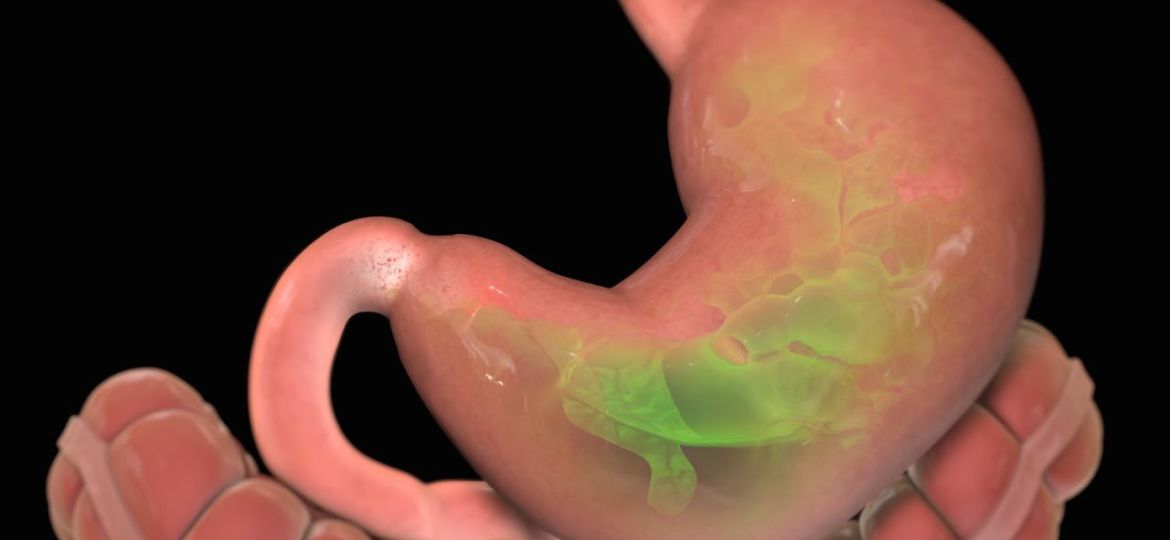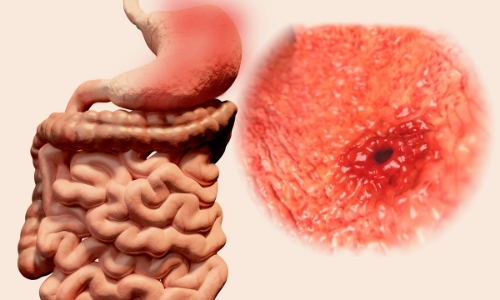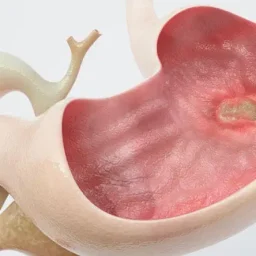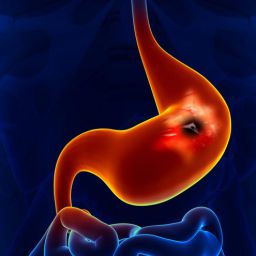
The Major Complications of Ulcers
Although most ulcers heal with proper treatment, they can sometimes lead to serious, potentially life-threatening complications. Here are some of the major complications that can arise from peptic ulcers:
1. Internal Bleeding
One of the most common and dangerous complications of ulcers is internal bleeding. The ulcer can erode into a blood vessel, causing blood loss into the stomach or intestines. This bleeding can range from mild to severe and may occur suddenly.
- Signs of Bleeding: The symptoms of internal bleeding from an ulcer include vomiting blood (which may appear red or resemble coffee grounds), black or tarry stools, and fatigue or dizziness due to blood loss. In severe cases, the bleeding can be fatal if not addressed promptly.
- Risk Factors: People who take nonsteroidal anti-inflammatory drugs (NSAIDs), such as aspirin and ibuprofen, or those who have an H. pylori infection are at a higher risk of developing ulcers that lead to bleeding.
2. Perforation (Hole in the Stomach or Intestinal Wall)
A perforated ulcer occurs when the ulcer eats through the wall of the stomach or intestine, creating a hole that allows food, digestive acids, and bacteria to leak into the abdominal cavity. This is an extremely serious complication that can lead to peritonitis, a potentially life-threatening infection of the abdominal cavity.

- Symptoms of Perforation: Sudden, severe abdominal pain, often described as sharp or stabbing, is the most common symptom of perforation. Other signs may include fever, nausea, vomiting, and a rapid heart rate.
- Immediate Medical Attention: Perforation requires immediate medical intervention. If left untreated, it can cause widespread infection in the abdomen, which can be fatal. Surgery is often necessary to repair the perforation and clean the infected area.
3. Gastric Outlet Obstruction
Gastric outlet obstruction occurs when an ulcer causes scarring and swelling in the stomach, blocking the passage of food from the stomach into the small intestine. This can lead to nausea, vomiting, and a feeling of fullness after eating small amounts of food.
- Symptoms: Individuals with gastric outlet obstruction may experience persistent vomiting (sometimes of undigested food), weight loss, and a feeling of fullness or bloating, even after consuming a small meal.
- Treatment: Treatment often involves medications to reduce the production of stomach acid and, in some cases, surgery to relieve the obstruction.
4. Cancer Risk
While peptic ulcers themselves do not directly cause stomach cancer, they can increase the risk of cancer in some individuals. Chronic ulcers, particularly those caused by Helicobacter pylori infections, may lead to changes in the stomach lining, such as atrophic gastritis or intestinal metaplasia, both of which are considered precursors to gastric cancer.
- Chronic H. Pylori Infection: Long-term H. pylori infection can cause inflammation and damage to the stomach lining, which may increase the likelihood of developing cancer over time. People with chronic ulcers caused by H. pylori are at a higher risk for this complication.
- Early Detection: Regular screening and monitoring are important for individuals with a history of chronic ulcers, particularly those with H. pylori infections. If caught early, treatment can help reduce the risk of progression to cancer.
5. Infection
While most ulcers are associated with H. pylori infection, other factors such as stress, excessive alcohol consumption, and the use of certain medications can compromise the immune system, making it more susceptible to infections. If an ulcer becomes infected, it can delay healing and worsen symptoms.
- Signs of Infection: Symptoms of infection may include fever, increased pain, and tenderness in the abdomen, and sometimes, a foul-smelling discharge.
- Antibiotics and Antacids: Infections caused by H. pylori or other bacteria typically require antibiotics. In addition, antacids or proton pump inhibitors (PPIs) are often prescribed to help promote healing and reduce acid production in the stomach.
How to Prevent Ulcer Complications
Preventing complications from ulcers involves addressing the underlying causes, managing symptoms effectively, and adopting lifestyle changes that promote overall gastrointestinal health. The following strategies are crucial in preventing complications associated with ulcers:
1. Eradicate H. pylori Infection
The first step in preventing complications from ulcers is addressing the root cause. H. pylori infection is a primary contributor to the development of peptic ulcers and is associated with an increased risk of ulcer-related complications.
- Treatment: A combination of antibiotics and proton pump inhibitors (PPIs) is the standard treatment for H. pylori infection. This regimen not only helps eradicate the bacteria but also reduces stomach acid production, promoting ulcer healing and reducing the risk of complications like bleeding or perforation.
2. Avoid Nonsteroidal Anti-inflammatory Drugs (NSAIDs)
NSAIDs, such as aspirin, ibuprofen, and naproxen, are widely used for pain relief but can irritate the stomach lining, increasing the risk of ulcers. For individuals who need these medications for chronic conditions, it’s essential to:
- Use Alternatives: Consider using alternative pain relief methods, such as acetaminophen, which has a lower risk of stomach irritation.
- Take NSAIDs with Food: If NSAIDs are necessary, they should be taken with food to minimize stomach irritation. Additionally, using a protective medication like a proton pump inhibitor (PPI) can reduce the risk of ulcers.
3. Limit Alcohol Consumption
Excessive alcohol use can irritate the stomach lining, contribute to acid production, and increase the risk of ulcers. To reduce the risk of ulcer complications, it is advisable to:
- Limit or Avoid Alcohol: Reducing or eliminating alcohol consumption can help protect the stomach lining from damage. If alcohol is consumed, moderation is key.
4. Quit Smoking
Smoking is a major risk factor for the development of peptic ulcers and can hinder the healing process. Nicotine reduces the production of bicarbonate in the stomach, which serves to neutralize stomach acid. It also increases stomach acid production, exacerbating ulcers.
- Smoking Cessation: Quitting smoking is one of the most important steps in ulcer prevention and management. Smokers who quit experience improved healing and a reduced risk of complications.
5. Follow a Healthy Diet
Eating a balanced diet can help protect the stomach lining and reduce the risk of developing ulcers. Certain foods can irritate the stomach lining, while others can promote healing.
- Avoid Irritants: Spicy foods, acidic foods (like citrus and tomatoes), and caffeine can irritate the stomach and exacerbate ulcer symptoms. Avoiding these triggers may help prevent ulcer complications.
- Include Healing Foods: Foods rich in fiber, such as fruits, vegetables, and whole grains, can promote healing of the stomach lining. Additionally, foods that contain antioxidants, such as berries, nuts, and seeds, may help reduce inflammation and oxidative stress in the stomach.
6. Manage Stress
While stress does not directly cause ulcers, it can worsen symptoms and interfere with healing. Chronic stress increases stomach acid production, which can irritate an existing ulcer.
- Stress Management Techniques: Practicing stress-relief techniques such as yoga, meditation, deep breathing exercises, and regular physical activity can help reduce stress levels and promote overall gastrointestinal health.
7. Regular Medical Check-ups
For individuals with a history of ulcers or those at high risk (such as those infected with H. pylori), regular check-ups are crucial for monitoring the condition and preventing complications.
- Endoscopy: For those with chronic ulcers or persistent symptoms, an endoscopy may be recommended to assess the ulcer’s progression and to rule out any signs of complications, such as bleeding or perforation.
- Blood Tests: Blood tests may be performed to check for signs of anemia, which could indicate bleeding ulcers, or to monitor infection.
Peptic ulcers can lead to serious complications, including bleeding, perforation, obstruction, and infection. While these complications can be severe, they are largely preventable with the proper treatment, lifestyle adjustments, and ongoing medical care.
Eradicating H. pylori infection, avoiding NSAIDs, limiting alcohol consumption, quitting smoking, and adopting a healthy diet are all key preventive measures that can reduce the risk of complications. Regular medical monitoring and stress management techniques are also essential in managing ulcers and preventing further complications.



